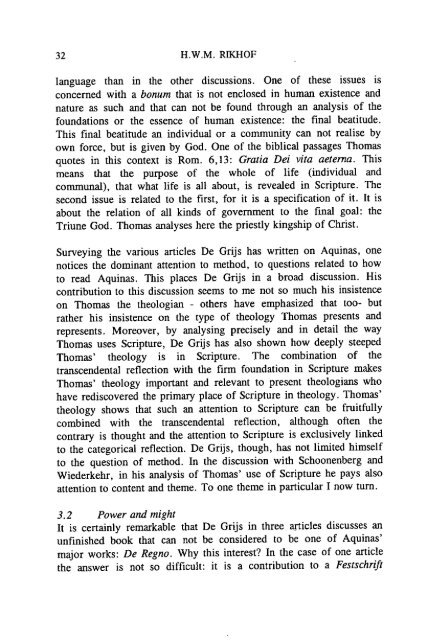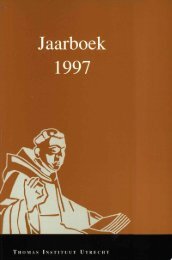Jaarboek Thomas Instituut 1995 - Thomas Instituut te Utrecht
Jaarboek Thomas Instituut 1995 - Thomas Instituut te Utrecht
Jaarboek Thomas Instituut 1995 - Thomas Instituut te Utrecht
Create successful ePaper yourself
Turn your PDF publications into a flip-book with our unique Google optimized e-Paper software.
32 H.W.M. RIKHOF<br />
language than in the other discussions. One of these issues is<br />
concerned with a bonum that is not enclosed in human exis<strong>te</strong>nce and<br />
nature as such and that can not be found through an analysis of the<br />
foundations or the essence of human exis<strong>te</strong>nce: the final beatitude.<br />
This final beatitude an individual or a community can not realise by<br />
own force, but is given by God. One of the biblical passages <strong>Thomas</strong><br />
quo<strong>te</strong>s in this con<strong>te</strong>xt is Rom. 6,13: Gratia Dei vita ae<strong>te</strong>ma. This<br />
means that the purpose of the whole of life (individual and<br />
communal), that what life is all about, is revealed in Scripture. The<br />
second issue is rela<strong>te</strong>d to the first, for it is a specification of it. It is<br />
about the relation of all kinds of government to the final goal: the<br />
Triune God. <strong>Thomas</strong> analyses here the priestly kingship of Christ.<br />
Surveying the various articles De Grijs has writ<strong>te</strong>n on Aquinas, one<br />
notices the dominant at<strong>te</strong>ntion to method, to questions rela<strong>te</strong>d to how<br />
to read Aquinas. This places De Grijs in a broad discussion. His<br />
contribution to this discussion seems to me not so much his insis<strong>te</strong>nce<br />
on <strong>Thomas</strong> the theologian - others have emphasized that too- but<br />
rather his insis<strong>te</strong>nce on the type of theology <strong>Thomas</strong> presents and<br />
represents. Moreover, by analysing precisely and in detail the way<br />
<strong>Thomas</strong> uses Scripture, De Grijs has also shown how deeply s<strong>te</strong>eped<br />
<strong>Thomas</strong>' theology is in Scripture. The combination of the<br />
transcendental reflection with the firm foundation in Scripture makes<br />
<strong>Thomas</strong>' theology important and relevant to present theologians who<br />
have rediscovered the primary place of Scripture in theology. <strong>Thomas</strong>'<br />
theology shows that such an at<strong>te</strong>ntion to Scripture can be fruitfully<br />
combined with the transcendental reflection, although of<strong>te</strong>n the<br />
contrary is thought and the at<strong>te</strong>ntion to Scripture is exclusively linked<br />
to the ca<strong>te</strong>gorical reflection. De Grijs, though, has not limi<strong>te</strong>d himself<br />
to the question of method. In the discussion with Schoonenberg and<br />
Wiederkehr, in his analysis of <strong>Thomas</strong>' use of Scripture he pays also<br />
at<strong>te</strong>ntion to con<strong>te</strong>nt and theme. To one theme in particular I now tum.<br />
3.2 Power and might<br />
It is certainly remarkable that De Grijs in three articles discusses an<br />
unfinished book that can not be considered to be one of Aquinas'<br />
major works: De Regno. Why this in<strong>te</strong>rest? In the case of one article<br />
the answer is not so difficult: it is a contribution to a Festschrift








